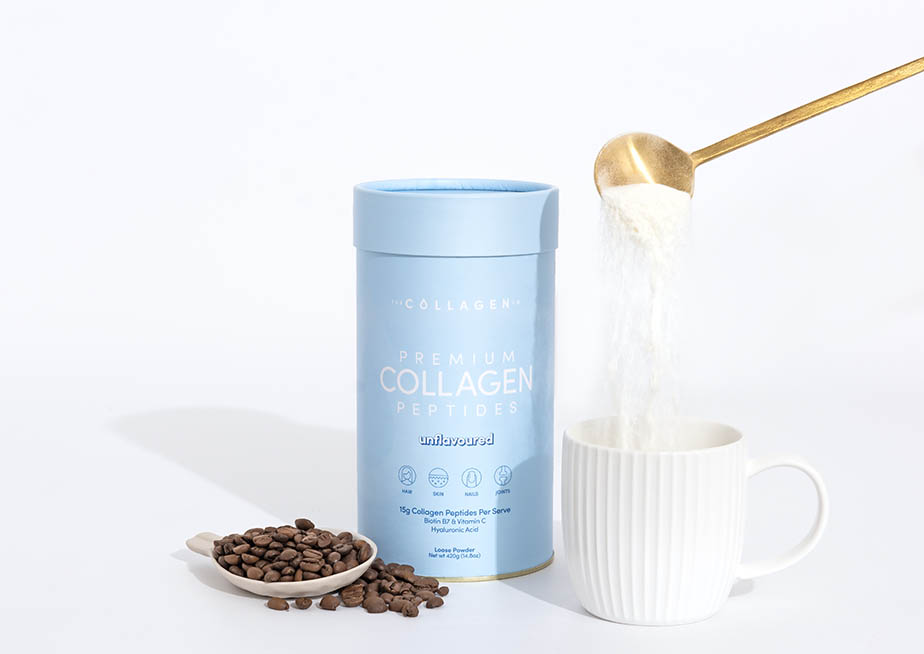Collagen is often described as an important protein that helps to prevent ageing and maintain skin health. It is known as an important protein that plays a vital role in maintaining the structure, elasticity, and integrity of our bodies.
Also referred to as the ‘building block’ of the skin, collagen forms a significant part of our extracellular matrix and makes up approximately 75% of the dry weight of our skin.
Unfortunately, as important as collagen is, collagen production naturally declines as we age, leading to visible signs of ageing and skin problems such as acne. Because of this, it is thought that by replenishing its production, we may be able to prevent these effects and maintain our overall skin health.
In this article, we will explore the importance of collagen for skin health and the benefits of supplementing our diets with it.
What is Collagen?
Collagen is a protein that is fibrous in nature and provides structural support to various tissues, including skin, bone, cartilage, tendons, and ligaments. It is primarily composed of amino acids such as glycine, proline, and hydroxyproline, which are arranged in a unique triple helix structure. This triple helix structure is what gives collagen its strength, allowing it to withstand tension and stress without breaking.
There are several types of known collagen, but Type 1 collagen is the most abundant in our body. Type 1 collagen is made up of three polypeptide chains, also known as alpha chains, which are intertwined in the unique triple helix structure mentioned above. Each of these chains is made up of amino acids, with a specific sequence of glycine, proline and hydroxyproline repeated throughout.
How do our bodies produce collagen?
Our bodies actually produce collagen through cells called fibroblasts. Fibroblasts are specialised cells found in the second layer of the skin, also known as the dermis, which lies beneath the outermost layer (epidermis). There, fibroblast cells make collagen by assembling amino acids in the correct sequence and repeating it to form its distinct triple helix structure.
However, collagen production in the body is not infinite. Factors such as age, genetics, hormonal changes, UV rays and pollution can impact and reduce the production of natural collagen. Which is why including collagen into our routines is a great way to counteract these factors and maintain collagen levels in our skin.
Collagen for Skin and Acne
Beyond being a vital protein, we need in our bodies, collagen is also essential for maintaining skin health because it gives our skin structure and prevents sagging and wrinkling. It goes even further by helping us retain moisture resulting in a ‘smooth’, youthful appearance. Because of this, with adequate levels of collagen, the skin can appear plump, firm, and even radiant.
Collagen can also be very beneficial for those of us who suffer from acne. This benefit is often overlooked, but collagen’s role in the skin can actually help minimise acne caused by excess sebum, clogged pores and trapped bacteria.
It does this by further strengthening the skin’s natural barrier, reducing inflammation and preventing bacteria from entering blocked pores. This can subsequently reduce the severity of acne and even minimise its frequency.
Collagen in skin care vs Collagen in supplements: Which should you choose?
Now that we have had a look at what collagen can do for our skin, let us take a look at the ways in which we can get it into our bodies.
Collagen can be introduced into the body in two main ways: The first is topically through skincare products such as creams and serums; the second is through supplements in our diet.
The first method is gaining popularity as many new skincare products claim to boost collagen levels, however there is actually little evidence to support the effectiveness of these products. The main challenge with these products is that because collagen molecules are so large, it is very difficult for them to actually penetrate the outer layer of our skin and reach the dermis. As a result, the benefits of these products can only be considered superficial and short-lived.
Collagen supplements, on the other hand, are specially formulated so that the collagen they deliver can be easily absorbed by the body. These supplements usually consist of hydrolysed collagen also known as collagen peptides, which are collagen molecules that have been broken down into smaller molecules for easy absorption by the body.
Choosing the collagen supplement that is best for you
Collagen supplement benefits range from skin rejuvenation to acne management so finding a product that fits your needs is important.
For people with active lifestyles, collagen protein powders are an excellent solution to easily incorporate collagen into your diet without the need for additional supplement drinks. By adding collagen into your protein drink, you can achieve your health and fitness goals while enjoying the benefits of collagen.
On the other hand, a blend of collagen peptides like those available from The Collagen Co. can be a highly beneficial choice for those looking to combine collagen with collagen-stimulating nutrients to promote overall health and well-being.
Either method will prove more effective than simply using topical collagen products, which, although they have their merits, offer a less effective approach to supporting collagen production than supplements.
“This is an Advertisement Feature”

















